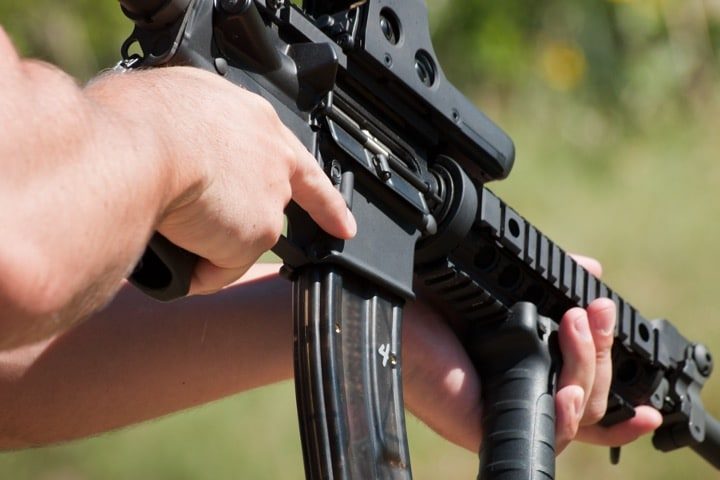
Anti-gun zealots populating Illinois’ legislative bodies passed a bill into law in January called the “Protect Illinois Communities Act,” or PICA. It was passed despite the clear ruling from the Supreme Court in New York State Rifle & Pistol Association, Inc. v. Bruen that the Second Amendment may only be contravened when a state can show that its law has a basis in history. The Bruen ruling was clear:
When the Second Amendment’s plain text covers an individual’s conduct, the Constitution presumptively protects that conduct. [A state] government [like Illinois] must then justify its regulation by demonstrating that it is consistent with the Nation’s historical tradition of firearm regulation.
Pro-2A groups such as the Second Amendment Foundation (SAF) have filed a friendly brief in support of continuing efforts to make permanent a district court’s temporary restraining order (TRO) against Illinois’ ban on “assault weapons” and “high capacity magazines” in the case Harrel v. Raoul.
U.S. District Judge Stephen McGlynn was wonderfully eloquent in his issuing of that temporary restraining order in April:
As Americans, we have every reason to celebrate our rights and freedoms, especially on Independence Day.
Can the senseless crimes of a relative few be so despicable to justify the infringement of the constitutional rights of law-abiding individuals in hopes that such crimes will then abate or, at least, not be as horrific?
More specifically, can PICA be harmonized with the Second Amendment of the United States Constitution and with Bruen?
That is the issue before this Court.
The simple answer at this stage in the proceedings is “likely no.” The Supreme Court in Bruen and Heller [District of Columbia v. Heller] held that citizens have a constitutional right to own and possess firearms and may use them for self-defense.
McGlynn saw through the motives of the Illinois legislators. They had little interest in protecting the rights of its citizens. They were angry over the Highland Park parade shooting that took place on July 4, 2022, and wanted to be perceived as “doing something” in response.
Said McGlynn:
PICA seems to be written in spite of the clear directives in Bruen and Heller, not in conformity with them. Whether well-intentioned, brilliant, or arrogant, no state may enact a law that denies its citizens rights that the Constitution guarantees them.
Even legislation that may enjoy the support of a majority of its citizens must fail if it violates the constitutional rights of fellow citizens.
He added:
In no way does this Court minimize the damage caused when a firearm is used for an unlawful purpose; however, this Court must be mindful of the rights guaranteed by the Constitution.
While PICA was purportedly enacted in response to the Highland Park shooting, it does not appear that the legislature considered an individual’s right under the Second Amendment nor Supreme Court precedent.
Moreover, PICA did not just regulate the rights of the people to defend themselves; it restricted that right, and in some cases, completely obliterated that right by criminalizing the purchase and the sale of more than 190 “arms.”
Furthermore, on January 1, 2024, the right to mere possession of these items will be further limited and restricted.
Accordingly, the balance of harms favors the Plaintiffs.
And so he issued the TRO.
SAF and other groups are now requesting that McGlynn make his TRO against PICO permanent. Their arguments are persuasive. Said SAF’s Executive Director Adam Kraut: “The state [of Illinois] would have the court believe these so-called ‘assault weapons’ are something relatively new, despite the fact such firearms and their magazines have been around for generations, and the technology has been around for more than a century.”
SAF’s arguments include:
- More than 25 million Americans own AR-15 style rifles;
- They bought them primarily for self-defense;
- Millions of Americans have in fact used one at least once in thwarting an armed criminal’s threat against them;
- The AR-15 type firearm is rarely used in incidents involving a firearm; and
- Criminals will not be impacted in the slightest if PICO is upheld.
On that last point, SAF stated that “violent criminals will not be meaningfully constrained by the State’s Magazine Ban. Given the hundreds of millions of such magazines in circulation in the country (including in Illinois, where they remain widely possessed), it will not be difficult for violent criminals to acquire them through illegal sales or importation despite the State’s ban.”
The SAF provided McGlynn with proof that “well under 1% [of crime guns] are ‘assault rifles.’”
They concluded:
The arms banned as “assault weapons” by Illinois are common by all counts:
(1) They are common categorically, as they are all semiautomatic in their function and operation;
(2) they are common characteristically, as they are all popular configurations of arms (e.g., rifles) with varying barrel lengths and common characteristics like pistol grips; and
(3) they are common jurisdictionally, lawful to possess and use in the vast majority of states now and throughout relevant history, for a wide variety of lawful purposes that include self-defense, proficiency training, competition, recreation, hunting, and collecting.
Lawyers for the state of Illinois defending PICO will have an impossible task: to overcome these arguments in order to preserve PICO. The momentum, thanks especially to the recent ruling in Bruen, is presently all on the side of legal gun owners.
Related articles:



